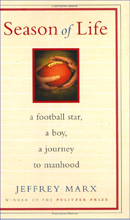Books |
Season of Life: A Football Star, a Boy, a Journey to Manhood
Jeffrey Marx
By
Published: Jan 01, 2005
Category:
Memoir
This is the ritual for Gilman School football players before each game:
Coach Joe Ehrmann: "What is our job as coaches?"
Players: "To love us."
Ehrmann: "What is your job?"
Players: "To love one another."
Creepy, huh? At the very least, embarrassing. I mean, here is a coach who used to play for the Baltimore Colts. And here are students at a posh Maryland private school. And instead of pumping one another to maim and kill on the football field, they’re pledging to….love one another?
What’s going on here?
As Jeffrey Marx tells it, this is a story of almost Biblical simplicity. Back in 1974, when he had just finished the sixth grade, Marx was a ball boy at the Colts’ training camp. He was a sweet kid, and the players adopted him. Jump-cut to 2001. Marx is now a Pulitzer Prize-winning journalist. The Colts have moved to a new stadium in a new city; Marx visits Memorial Stadium in Baltimore shortly before it’s to be torn down. And then he gets an idea: He’ll look up the players who befriended him almost three decades ago.
Joe Ehrmann, he discovers, has turned into a hero.
This was not intentional. Ehrmann’s younger brother had died of cancer. Ehrmann had turned to God. And not half-heartedly — he’d become a minister. And he had a mission: to help boys become men.
By this he did not mean what many Americans do. He wasn’t about building toughness. Or independence. He thought that tough-guy, John Wayne ideal was a lie, and that it led to "tremendous dysfunction both in marriages and relationships, and in the social problems of America" — he wanted to stamp out what he called "the leukemia of masculinity."
If young boys don’t feel they have "the right stuff," he believed, they develop "the right bluff." But if a coach helped them see another way, and if that other way both liberated them and helped them become better players…
So Ehrmann became a football coach. A coach who demanded greatness from his players — and defined "greatness" as "the impact you make on other people’s lives."
He didn’t care if his team won. Only about the lessons he wanted his players to learn. And as we follow the Gilman team through the 2001 season, we see how well he does — and how well his players do. [To buy the book from Amazon, click here. For the Kindle edition, click here.]
At one point a parent asks Coach Ehrmann’s assistant how he thinks the boys will do. "I have no idea," he says. "Won’t really know for twenty years." The parent stumbles off, baffled. Clearly, she has no clue what her son has been learning on the football field.
But by then we do. And we see how an openly emotional coach can become a surrogate father — and genuine role model. And how that approach, far from making boys soft, seems to turn them into winners. Boy after boy "gets it" in these pages; if you are an employer who really values integrity, these are kids you’d want working for you.
For a Pulitzer winner, Jeffrey Marx writes with his feet — I winced when he described 9/11 as "a morning that will forever stand in infamy." But that doesn’t matter; in these 177 pages, the story’s the thing.
Got a father you can’t really talk to? A friend who’s a coach? A child you can’t quite reach? Or even just someone who works with kids? This is the book to give. It is preachy in the extreme, but preachy in a good way — lessons you wouldn’t want to hear from a bespectacled intellectual carry more weight when they come from a hulk of a man, a guy who learned love in the trenches.
Kleenex? Mandatory. Resistance? Useful. Revelation? Guaranteed. This is one of the rare books — it can change your life.


